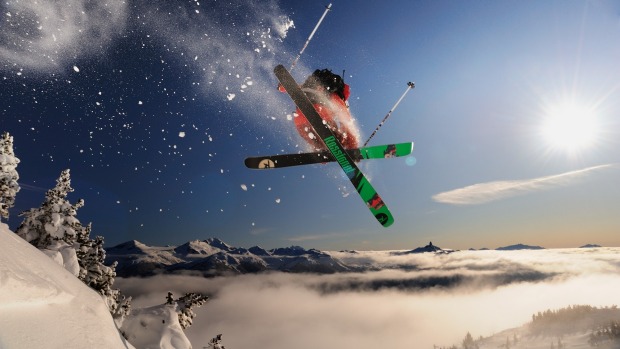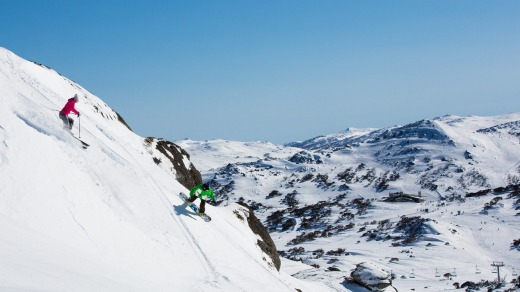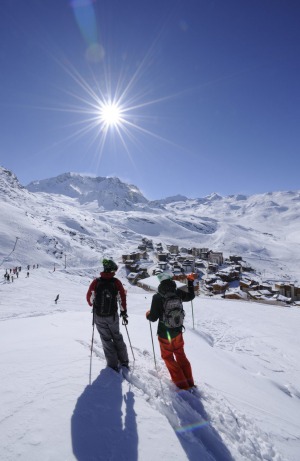
Diehard ski and snowboard lovers in search of a never-ending winter need search no more. It is possible, with some planning, to ski 365 days a year. Consider this skiing calendar of the best places to ski each month of the year as the gift that just keeps on giving.
Nozawa Onsen, Japan
Our pick of Japan's 500 plus ski resorts is the feudal town of Nozawa Onsen, a traditional farming village that is home to 50 private and public onsens, cobbled laneways, traditional ryokans and one hell of a fire festival every January 15.

Expect 50 kilometres of marked skiing trails and 14 metres of annual snowfall. Then drag yourself away from the powder to witness a 150-year-old festival that involves 42-year-old men strapped to a wooden effigy and 25-year-old men fighting off sake-fuelled villagers charging the three-storey structure with burning flames.
Nozawaski.com
Beaver Creek, Colorado, US

Channel your inner Rothschild and bed down in the gated community of Beaver Creek ski resort where skier and boarders catch a covered escalator to the slopes and freshly baked cookies are handed out by white-hatted chefs daily at 3pm.
Add 1800 skiable acres, more than 1000 metres of vertical rise, and close to eight metres of dry Colorado powder snowfalls a season.
Come February 2015 skiers and boarders at "the Beave" will be witness to the world's best ski racers as they host to the FIS Alpine World Ski Championships from February 2 to 6.
Beavercreek.com
Whistler Blackcomb, Canada
Whistlerblackcomb.com
The snowfall in March in Whistler Blackcomb is impressive enough with a five-year average of 281 centimetres. But this is on top of the seven winter metres that will have fallen before March 1 even comes around. Spring skiers will enjoy more than 8000 acres of skiable terrain across two mountain peaks, 1600 metres of vertical rise, and 17 on-mountain restaurants to rest your burning thighs.
Ischgl, Austria
What do Mariah Carey, Robbie Williams, Elton John, Bob Dylan, Jon Bon Jovi and Pink have in common? They've all performed at Ischgl's Top of the Mountain live concert series. The Tyrolean resort in Austria hosts three concerts a year, one at the opening of the season, one at Easter in April and one at the closing in May.
Ischgl's ski resort, Silvretta Arena, has more than 230 kilometres of ski runs and is also connected to Samnaun in Switzerland so you can ski two countries in a day while waiting for the headline acts to take the stage.
Riksgransen, Sweden
Riksgransen.se
Ski here in January and you'll be skiing in the dark, literally, which is why the resort doesn't open until February. Riksgransen sits inside the Arctic Circle on the border with Norway, 1400 kilometres north of Stockholm. Visit in May and expect 24-hour daylight. The resort is also home to one of Sweden's top five hotels, the 14-guest room Meteorologen Hotel, which is done in expected and coveted Scandinavian style.
Saas Fee, Switzerland
Saas-fee.ch
Saas Fee is a town built for clichés. Chocolate box perfect with pristine mountain vistas, you get the picture. The mountain village is pedestrian only, which adds to the charm, and come the northern summer the chairlifts still access the skiable glacier up high. Expect 20 kilometres of groomed piste runs, terrain parks and on-mountain dining and an annual June Alpine Farmers' Festival including cow fights and goat gatherings.
Perisher, Australia
Perisher.com
Australasia's largest ski resort has more than 1245 hectares of skiable terrain, seven mountain peaks, five terrain parks, a halfpipe and 47 lifts. The 15-year average for snow depth at Perisher is 1.9 metres and the resort has invested heavily in more than 50 hectares of snow making, so come July you should find some decent snow to slide on.
Portillo, South America
Skiportillo.com
High in the Andes, two hours from Santiago, sits a giant yellow lodge at the top of a heart-pounding switchback road. This is home for a week at a time for a mere 400 fellow skiers and boarders. The mountain has 1235 acres of skiable terrain split mainly between intermediate, advanced and expert ability. Head here in August and share the slopes with the world's best extreme skiers and international racers who train on the 35 runs.
Mt Ruapehu, New Zealand
Mtruapehu.com
Mt Ruapehu is an active volcano that is home to two resorts, Whakapapa and Turoa, and is midway between Auckland and Wellington. Combined the two resorts have more than 1000 hectares of terrain and Turoa has the longest vertical rise in Australasia at 722 metres.
Ruapehu is known to have the longest ski season in New Zealand and has been known to stay open until late October and even November. Unlike the South Island resorts, few Australians know of its existence so you are less likely to share the chairlift with your nextdoor neighbours' in-laws from back home.
Hintertux Austria
Hintertuxergletscher.at
October and November are traditionally such snow limbo months. Thank the snow gods for the Hintertux Glacier in Austria for being open 365 days a year with more than 60 kilometres of groomed slopes. Free skiers and terrain park rats are also catered for with an altitude lung-busting park at 3200 metres above sea level.
Zermatt, Switzerland
Zermatt.ch
Like Hintertux, Zermatt has skiing and boarding on offer every day of the year. The 500-year-old village is home to the impressive Klein Matterhorn (3883 metres). Glacier skiing allows year-round fun with 25 kilometres of summer pistes accessed by eight lifts and if you're lucky then more runs may be open by November, sometimes down to Furgg offering a 1400-metre vertical drop.
Val Thorens, France
Valthorens.com
Val Thorens is considered the highest altitude resort in Europe and has more than 600 kilometres of interconnected runs on the combined Les 3 Vallees pass (Val Thorens, Courchevel, Meribel and more). They open at the end of November and even in a bad Val Thorens season the Glacier de Peclet will always be open. Plus Club Med opens its new Val Thorens Sensations luxury all-inclusive retreat this December for a one price no hidden extras ski holiday.